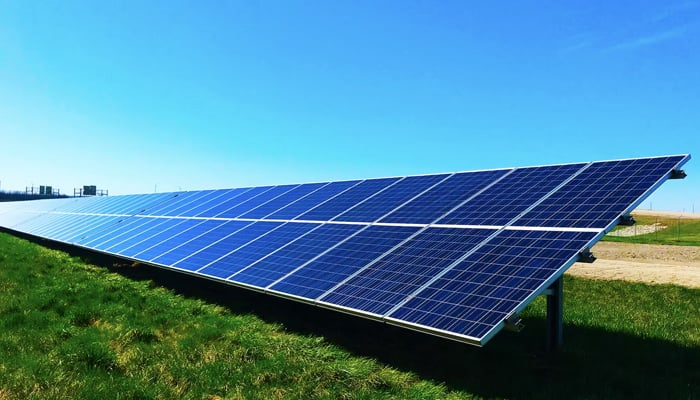‘Insurers eye renewable energy in Pakistan’
It is noteworthy to mention here that Pakistan’s solar and wind power potential is over 40,000 megawatts
KARACHI: Global and local insurance companies are looking to tap into Pakistan’s energy sector, which is expected to see billions of dollars of new investments in renewable and conventional power projects in the coming years, industry experts said on Tuesday.
At the Energy Summit: Fostering Growth, Collaboration, and Resilience in Pakistan's Energy Mix, speakers from various insurance firms and energy companies discussed the role of insurance in facilitating the development and sustainability of Pakistan’s energy mix, which aims to increase the share of clean and renewable sources to 60 percent by 2030.
Speakers included Ata Khatib, Chairman Lockton MENA; Dr. Jason Shirley, General Manager at ECP Energy and Chemical Professionals; Phil Pavey, Senior Underwriter at GCube Insurance Services; Pavel Chernoverkhskiy, Chief Underwriting Officer at Zurich Insurance Company; Khurram Ali Khan, CEO of Fidelity Insurance Brokers, along with other industry leaders representing Independent Power Producers (IPPs) within Pakistan, Oil and Gas regulators, and accomplished insurance experts.
According to a statement, there are various hydropower projects being developed in Pakistan, including Bunji (7,100 MW), Diamer Basha (4,500 MW) in Gilgit-Baltistan, Thakot (4,866 MW), and Dasu (4,320 MW) in Khyber Pakhtunkhwa.
They said that the government developed a policy under three objectives, including universal access to energy, doubling the share of renewable energy, and doubling the rate of energy efficiency and conservation. In this regard, the target has been set as 60% of Pakistan's energy will be clean and renewable by 2030. It is noteworthy to mention here that Pakistan’s solar and wind power potential is over 40,000 megawatts. Also, 30 percent of vehicles will be electric by 2030.
They said that Sustainable Development Goals (SDG 7), which call for universal access to clean and sustainable energy, were indispensable for progress on all 17 SDGs as well as climate goals.
These projects are being developed from public funds and financing from different agencies. Moreover, various countries are planning to invest in Pakistan's energy sector, mainly China and Kingdom of Saudi Arabia.
They said that in recent years, these two countries announced mega projects in the energy sector. China will construct the largest civil nuclear power plant to produce 1,200 megawatts of electricity daily to the national grid at an estimated cost of at least $3.5 billion. The plant is known as Chashma-5 and will be completed by 2030. The Kingdom of Saudi Arabia plans to install 500 megawatts of renewable energy projects worth $4.5 billion in Baluchistan and a $10 billion mega oil refinery in Gwadar.
-
 Australia To Launch First High-speed Bullet Train After 50-years Delay
Australia To Launch First High-speed Bullet Train After 50-years Delay -
 Meghan Markle Turns To Desperate Bids & Her Kids Are Her ‘saving Grace’: Here’s What They’ll Do
Meghan Markle Turns To Desperate Bids & Her Kids Are Her ‘saving Grace’: Here’s What They’ll Do -
 King Charles Gives A Nod To Sister Anne's Latest Royal Visit
King Charles Gives A Nod To Sister Anne's Latest Royal Visit -
 Christian Bale Shares Rare Views On Celebrity Culture Urging Fans Not To Meet Him In Person
Christian Bale Shares Rare Views On Celebrity Culture Urging Fans Not To Meet Him In Person -
 Ariana Grande To Skip Actor Awards Despite Major Nomination
Ariana Grande To Skip Actor Awards Despite Major Nomination -
 North Carolina Teen Accused Of Killing Sister, Injuring Brother In Deadly Attack
North Carolina Teen Accused Of Killing Sister, Injuring Brother In Deadly Attack -
 Ryan Gosling Releases Witty 'Project Hail Mary' Ad With Sweet Reference To Eva Mendes
Ryan Gosling Releases Witty 'Project Hail Mary' Ad With Sweet Reference To Eva Mendes -
 Teyana Taylor Reveals What Lured Her Back To Music After Earning Fame In Acting Industry
Teyana Taylor Reveals What Lured Her Back To Music After Earning Fame In Acting Industry -
 Prince William Shows He's Ready To Lead The Monarchy Amid Andrew Scandal
Prince William Shows He's Ready To Lead The Monarchy Amid Andrew Scandal -
 Lux Pascal Gushes Over Role In Tom Ford's 'Cry To Heaven': 'I Just Wanted To Be Part Of This Picture'
Lux Pascal Gushes Over Role In Tom Ford's 'Cry To Heaven': 'I Just Wanted To Be Part Of This Picture' -
 Near-blind Refugee Found Dead In Buffalo After Release By US Border Patrol
Near-blind Refugee Found Dead In Buffalo After Release By US Border Patrol -
 Firm Steps In Forcing Andrew’s Hand: ‘Can No Longer Keep A Promise'
Firm Steps In Forcing Andrew’s Hand: ‘Can No Longer Keep A Promise' -
 Kenyan Man Accused Of Recruiting Men To Fight In Ukraine
Kenyan Man Accused Of Recruiting Men To Fight In Ukraine -
 'The Wrong Paris' Star Veronica Long Shares What New Crime Series 'Blue Skies' Is About
'The Wrong Paris' Star Veronica Long Shares What New Crime Series 'Blue Skies' Is About -
 King Charles Remains Immersed In Work Amid Andrew Scrutiny
King Charles Remains Immersed In Work Amid Andrew Scrutiny -
 Bobby J. Brown's Passing Adds To Growing List Of Celebrity Deaths In 2026
Bobby J. Brown's Passing Adds To Growing List Of Celebrity Deaths In 2026




